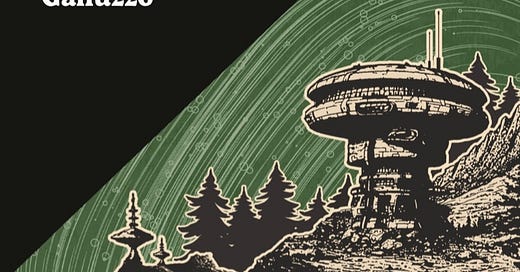Our writing—even when that writing is impersonal, analytic, or historical—always bears the scars of who and what we are when we make the work. This is how a short, idiosyncratic, history of Seventies counterculturalism can also be a memoir of 2021 and its fantasies of transformation.
I wrote what became my book, Against The Vortex: Degrowth Utopias in the 1970s and Today, in the woods during the spring and summer of 2021. I had left New York City and the apartment on Humboldt St I’d lived in for a decade—my slumlord finally got me out with the help of the pandemic—and decamped for a semi-derelict early nineteenth-century farmhouse in Austerlitz: a spooky, sylvan place on the New York/Massachusetts border.
I took my cat, Mochi, who died, prematurely, of a heart infection. She at least got some open space and the company of creatures other than the rats and roaches of the city. This was her second life. Against type, she was only granted two.
The world had stopped, and during this civilizational intermission, we held our breaths in wonder: would the old, rotten order of things implode? And would something better, slower, and more communal emerge in its place? Against The Vortex came out of this sometimes beautiful ferment, a moment enchanted and anxious.
Whatever the merits of the pandemic lock-downs in retarding the spread of C-19, this pause offered many of us—the lucky ones who weren’t made to grow, move, or deliver the food that sheltering-in-place PMC types needed to live and opine—room and breath for the first time in such a long time or for the first time period.
I was, as I am now, a precarious academic off the tenure track—a lecturer in literature at The New School—who suddenly had access to supplemental UI in addition to the various stimulus checks: it felt like a windfall! When my classes resumed, after a significant hiatus, they resumed online, and I could teach, incongruously, from the forest.
I, and so many others, had time to think and dream again, free from the crushing pressures of the grind. I was reading and writing, in a desultory way: the gestational phase out of which the book was born. Was this a taste of a UBI-enabled degrowth utopia? Yes and no. Has life ever been so mediated by the screen and the app? And the Silicon Valley vampires certainly seized the moment to further insinuate themselves into our daily lives, destroying education and human cognition in toto, as we see now. Finally, embodied contact and communion are essential. This was also a taste of high-tech dystopia: the Vortex.
But the stillness. Remember the various accounts of whales in commercial harbors, of dolphins returning to the Venetian canals? Remember when the earth was healing? We were healing at least. Whether these stories were true or no, they made apt emblems for our brief “epoch of rest,” after the subtitle to William Morris’s News From Nowhere.
So, yes, the book is about Zardoz, that weird John Boorman film with the flying stone head, but I also use this psychedelic cultural artifact to revisit the neo-romanticism, the neo-Luddism, the critical Aquarianism of a certain 1970s-era set of thinkers and artists : Brown and Illich and Becker and Le Guin and Merchant. Artists and thinkers who asked questions like: can we think utopia—non-Euclidean, open-ended, imperfect—and biospheric limits together? What might a new social arrangement animated by such imperatives look like? And can we abandon the Promethean fantasies of modernity and embrace our common creaturely condition—a condition marked by birth, death, embodiment, and fragility? Another foundation for another kind of socialism, or love as a politics.
We all know what happened next: that old, rotten world came back, but much worse. And now we are racing toward a cataclysm. What rough beast indeed.
Instead of a slower, more convivial life in common we have Silicon Valley Prometheanism—the real life equivalents of Zardoz’s Eternals in the form of Musk, Thiel, Zuck—and we have the transactional gangsterism of Trump, like my outer borough father* writ large: monsters now married and in power. Everything I oppose and despise. While the earth is burning.
My book is about the early 1970s but it is also a testament to the window that opened, briefly, four years ago, through which I spied another mode of being, being-together, being-in-common. And then the window closed. The eighth life. And one which now seems so long ago and far away mid-ninth.
*During his New York days, slumlord scion and crooked developer Trump was the idol and apotheosis of every Mario and Dominic and Pavel—contractors and car wash magnates and strip club owners—in Staten Island and Queens and the Far Rockaways. As my father used to say: we gotta run the govmint like a bidness. In other words: a dictatorship. On the national stage, this political Tony Soprano-ism is something like fascism, but with an ostentatiously gold-plated streak of corruption, graft, and self-dealing. Which, I suppose, differentiates it from the historical fascisms with their militaristic forms of organization and rage for order. Mussolini famously suppressed the Mafia in Sicily (who in turn provided a helping hand to the Allies in the United States and during the Allied invasion of Italy). There can only be one Don after all. Brecht also made the connection between Nazism and gangsterism (see also Lang’s M). Odd that this element of Trumpism is mostly missing from the discourse.




Gonna get a copy of your book—sounds fascinating